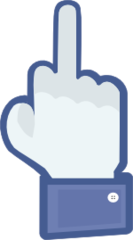Censorship Likes Centralisation
Hollande wants big websites such as Facebook, Google, etc, to police themselves. According to him, they should delete any "illicit" content their users publish, preferably without government intervention. A bit like a private extension of the Ministry of Censorship.
This privatisation is only possible because of the fact that the majority of online activity revolves around these few very big services. For some users they are almost the only services they use. Because of this, any information that disappears from these spaces is information that plain disappears.
Facebook, Twitter and others are not Public Spaces
If Facebook wishes to delete data, it's their right. They owe nothing to their users, it's clarified in their terms and conditions which all their users have accepted. The same goes for other services such as Twitter, Blogger, etc. These services usually defend free expression.
However, when there's a choice to be made between getting your services banned from a country or collaborating with politically motivated censorship, the choice is not hard.
For example, Facebook blocked a page in support of Navalny, a Putin opponent. In this case, Facebook voluntarily participated in censorship. In my opinion, Putin had more to lose by blocking Facebook in Russia than Zuckerberg refusing collaboration. Needless to say, Zuckerberg is "Charlie" only in the form of a "status update".
We follow the laws in each country, but we never let one country or group of people dictate what people can share across the world.
The worst part of this story is the fact that Facebook blocked this page, not only in Russia, but also for any Russian citizen. This means that a Russian person, outside of Russia could not access this Facebook page.
With individual identification across these services, a country's censorship can follow its citizens beyond its borders. Imagine us forbidding a North Korean refugee to read news articles that criticise Kim Jong Un, or forbidding a Saudi woman from driving in the UK.
This isn't a Russian problem, in Turkey images of the prophet are illegal, or more accurately, censored an so they are blocked by Facebook.
Twitter warned us in early 2012 of their new system that would ease per country censorship. With these kind of systems censorship becomes easy, practical and can be done "with just one click".
Tools for Revolution, Revolting
When people say that Facebook and Twitter are platforms for popular revolution, what should be understood is "permitted revolutions". Twitter, Facebook, Google and any other popular communications tool with a central point of control have become targets (or tools) for censorship.

Facebook is as helpful in organising revolutions as it is in preventing them
This isn't 100% censorship but it might be more efficient. There's less and less talk about censoring "regular" websites and more and more about censoring social media sites and search engines. It's easier and more efficient than chasing down every concerned webmaster and/or users of these services.
An added bonus is on the legal side, such practices are much easier to defend. People may continue to practice free expression, however these publications may become hard or even impossible to find.
We're no longer talking about a permanent and tangible form of censorship, as in China or Saudi Arabia, this form of censorship is more discreet, very configurable, non-permanent, almost invisible. The more we revolve around centralised communications the easier it becomes to suppress speech.

